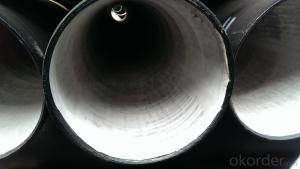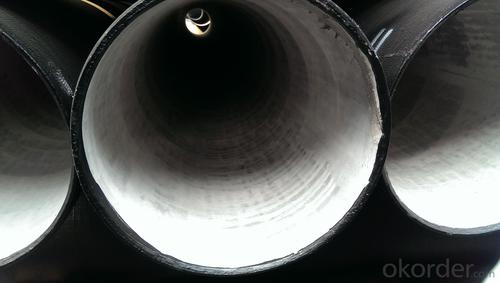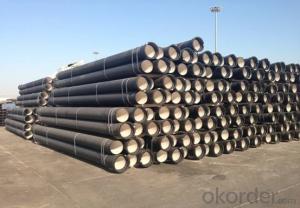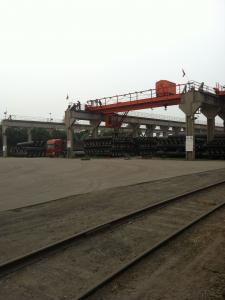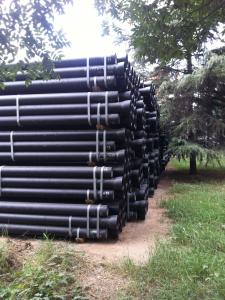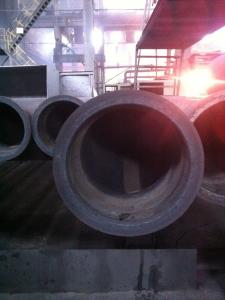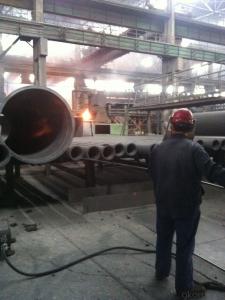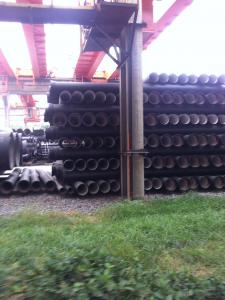DUCTILE IRON PIPES AND PIPE FITTINGS K9 CLASS DN1300
- Loading Port:
- Tianjin
- Payment Terms:
- TT OR LC
- Min Order Qty:
- 22 m.t
- Supply Capability:
- 30000 m.t/month
OKorder Service Pledge
OKorder Financial Service
You Might Also Like
Material : Ductile Cast Iron
Size Range : DN 80mm to DN 2000mm
Unit Effective Length : 6m or 5.7m
Manufacture Standard: ISO 2531:1998/ EN 545:2006/EN 598:2007
Annual capacity : 200,000 tons
Coating Exterior: Zinc 130g/m2 according to ISO 8179-1 and bitumen coating 70 microns.
Cement Interior: Portland Cement/ High Alumina Cement/ Sulphate Resisting Cement Lining according to ISO 4179
Special requirements on external coating and internal lining can be applied
We also provide accessories such as SBR/EPDM rubber gaskets, lubricant paste, pipe caps, PE sleeves, etc.
Additional Parts:
Each pipe is strictly inspected according to related standard to ensure permanently high performance.
Easy Installation at site and service free for life
Long Service Lifespan
Quotation will arrive you within 24hours once we get your inquiry.
We guarantee offering you a competitive price.
A copy of original inspection reports of pipes will be offered after shipment.
Photos of loading process will be sent to the customer after shipment effect.
We will follow-up the delivery progress after shipment effect and update to the customer on weekly basis.
- Q: Fire water supply network adopts ductile iron pipe, the test pressure should be no more than MPa
- To your selected fire pump highest lift 1.5 times to suppress, generally not more than 1.6MPa, if the use of ductile iron pipe, test pressure according to 2MPa to suppress.
- Q: How can the ductile iron pipe elbow be fixed?
- Ductile cast iron pipe in the groove pipe connection technology is also called the lathedog connection technology, has become the most liquid and gas pipeline connection technology, although this technology is later than foreign in domestic development time, but because of its advanced technology, domestic market quickly received. Since 1998, it has been developed and applied in just a few years. It has gradually replaced two traditional ways of pipe connection, such as flange and welding. Not only technically more mature, the market is generally recognized, but also by the national laws and regulations actively guide the policy. The application of grooved pipe connection technology makes the complex pipe connection procedure simple, fast and convenient. Took a big step forward in pipeline connection technology.
- Q: Are ductile iron pipes resistant to acid mine drainage corrosion?
- Generally, ductile iron pipes are resistant to corrosion caused by acid mine drainage (AMD). Ductile iron is a highly durable material that has been widely used in various industries, including mining and water distribution, because of its excellent ability to resist corrosion. AMD is a significant environmental issue that occurs when water comes into contact with sulfide minerals in mining areas, resulting in the formation of sulfuric acid. This acid can cause damage to various materials, including pipes, and can contaminate water sources. Ductile iron pipes have a protective layer made of cement mortar or epoxy coating, which acts as a barrier between the corrosive AMD and the pipe material. This protective layer prevents direct contact and reduces the likelihood of corrosion. Moreover, ductile iron pipes have a strong resistance to both internal and external corrosion, making them suitable for environments where AMD may be present. They have a proven track record of reliability and longevity, even in harsh conditions, ensuring the integrity of the water distribution system and minimizing the risk of leaks or failures. However, it's important to note that the resistance of ductile iron pipes to AMD corrosion can depend on other factors, such as the specific composition and concentration of the AMD, the duration of exposure, and the temperature. Therefore, it is recommended to seek advice from experts and conduct thorough material testing and analysis to determine the suitability of ductile iron pipes in specific AMD environments.
- Q: Deep well spiral iron pipe, or ductile iron tube?
- Ductile iron pipes mainly called centrifugal ductile iron pipe, it has the properties of nature, iron and steel, excellent corrosion resistance, good ductility, good sealing effect, simple installation, mainly for municipal, industrial and mining enterprises, water supply, gas, oil etc.. Water supply pipe is the first choice, with high cost performance. Compared with the PE pipe, from the installation time, ductile pipe PE pipe installation is simple and rapid, and after the installation of internal and external pressure bearing better tightness and corrosion resistance; from the point of view, ductile pipe sealing better after installation, but also can improve the corrosion resistance of corrosion protection through a variety of means; from the hydraulic performance, because ductile pipe specifications generally refers to the inner diameter of PE pipe diameter specifications generally refers to the same specifications, because under the condition of ductile pipe can achieve greater runoff; from the installation and maintenance cost, ductile pipe have more favorable price. The main components of ductile iron pipes are carbon, silicon, manganese, sulfur, phosphorus and magnesium. The inner wall of zinc spray, anti-corrosion materials such as cement mortar.
- Q: What is the expected sound attenuation of ductile iron pipes?
- The expected sound attenuation of ductile iron pipes can vary depending on various factors such as pipe diameter, thickness, and the surrounding environment. However, ductile iron pipes generally provide good sound attenuation due to their dense and heavy construction, which helps to minimize the transmission of sound waves.
- Q: What is the difference between a cast iron pipe and a ductile iron pipe?
- Nodular cast iron has high strength and strong plasticity. The tensile strength of ductile iron is twice that of gray iron, and the yield strength even exceeds that of cast steel.
- Q: How do ductile iron pipes perform in high-temperature steam applications?
- Ductile iron pipes excel in high-temperature steam applications thanks to their remarkable performance. They can withstand elevated temperatures and maintain their structural integrity, making them highly suitable for steam distribution systems. One notable advantage of ductile iron pipes in high-temperature steam applications lies in their exceptional thermal conductivity. This property enables efficient heat transfer, ensuring that the steam is delivered at the desired temperature with minimal loss. Additionally, the high thermal conductivity of ductile iron helps to mitigate the risk of thermal expansion and contraction, which can lead to pipe failure or leakage. Moreover, ductile iron pipes boast a high melting point, typically around 2000°F (1093°C). This resistance to extreme temperatures encountered in steam applications ensures that the pipes remain intact and do not deform, guaranteeing the reliability and longevity of the piping system. Another crucial factor contributing to the performance of ductile iron pipes in high-temperature steam applications is their corrosion resistance. These pipes are usually coated with epoxy or other protective materials to prevent corrosion and maintain their structural integrity, even in aggressive steam environments. This corrosion resistance ensures that the pipes can endure harsh conditions and operate efficiently over an extended period. In conclusion, ductile iron pipes are an ideal choice for high-temperature steam applications due to their excellent thermal conductivity, high melting point, and corrosion resistance. These properties make them a reliable and long-lasting option for steam distribution systems, ensuring the safe and efficient transportation of steam at elevated temperatures.
- Q: Can ductile iron pipes be used for river crossings?
- Yes, ductile iron pipes can be used for river crossings. Ductile iron is a strong and durable material that can withstand the stresses and pressures of being installed underground and crossing rivers. It is commonly used in water and sewage systems, including river crossings, due to its resistance to corrosion and its ability to handle high water pressure.
- Q: Advantages and disadvantages of ductile iron pipes
- The ductile iron pipe is widely used not only in foreign countries, and has also been in the country to promote the use of good, in many areas of our country, ductile iron pipe has been widely used in medium and small diameter water supply pipe; compare the performance of ductile iron pipe and steel pipe: steel pipe can be divided into seamed steel pipe and seamless in the water supply pipe, commonly used in welded tube. Compared with ductile iron pipes, the steel tube has the advantages of good toughness, high tensile strength, thin tube wall, high pressure resistance, long pipes and less interfaces. The biggest drawback is that the corrosion resistance is poor and the price is high. So, in general, except for small bore pipes and special projects (such as pipe jacking works);
- Q: Can ductile iron pipes be used for underground cooling water systems?
- Yes, ductile iron pipes can be used for underground cooling water systems. Ductile iron is known for its strength, durability, and corrosion resistance, making it suitable for various applications, including underground installations. It can withstand the pressure and temperature requirements of cooling water systems, providing a reliable and long-lasting solution.
Send your message to us
DUCTILE IRON PIPES AND PIPE FITTINGS K9 CLASS DN1300
- Loading Port:
- Tianjin
- Payment Terms:
- TT OR LC
- Min Order Qty:
- 22 m.t
- Supply Capability:
- 30000 m.t/month
OKorder Service Pledge
OKorder Financial Service
Similar products
Hot products
Hot Searches
Related keywords
